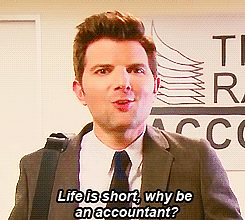An accountant. If you are not an accounting major nor an actual accountant, the first image that may come to mind is a very boring, cheap, math nerd. Millennials may even picture someone like Angela or Kevin from the accounting department in The Office.

Stereotypes are a mistaken idea or belief that many people hold about a group of people, and is oftentimes based off of social media or even one interaction with a certain group; and many people hold stereotypes about accountants that do not reflect the reality of the profession. Read on to learn the truth about accountants!
- Accountants are Boring and Introverted.
People who study to be an accountant can be very outgoing. Take for example these celebrities who studied accounting in college:
- Kenny G, famous saxophonist, has a degree in accounting from the University of Washington.
- Chuck Liddell – MMA/UFC Fighter, doesn’t only have the skillset to be a former UFC Light-Heavyweight Champion, but he is also a trained accountant; he graduated California Polytechnic University with a BA in Business and Accounting.
- Mick Jagger, Rolling Stones front man, studied accounting at the London School of Economics while on a scholarship.
- Janet Jackson was also one of many celebrities who has accounting knowledge and has studied accounting in college.
As you can see, an accountant does not have to be dull, or introverted, because anything is possible and they are just like anyone in any other occupation.

- Accountants are VERY good at math.
In real life, accounting only usually involves basic math skills like addition, multiplication, and subtraction for financial statements. Accountancy is more than just “soft math” skills; successful accountants must have high-level analytical skills, to be able to eloquently communicate verbally and in writing, and also be proficient in professional writing.

- Accountants LOVE to do taxes and are tax experts.
Tax accountants make up only a very small portion of all accounting professionals. Furthermore, all accounting professionals have different types of specialties besides taxation like financial accounting, budgeting, cost accounting, auditing, and government accounting. All accountants will have basic tax knowledge from the classroom, but to people’s surprise, those who are NOT specialized within taxation will NOT know as much as an actual tax accountant.

- Accountants do not have lives outside of the office.
To prove this wrong, according to U.S. News, accountants are ranked #3 in “Best Business Jobs.” U.S. News ranks jobs by incorporating a plethora of factors including stress level and work-life balance. Stress-level was ranked 6, which is “average”, based on their ranking system. While accountants work-life balance is an 8 out of 10 points, with 10 being the highest. This shows that accountants are VERY capable of juggling work and their life outside of work, including: children, family, and social life.

- Accountants just sit at a desk in a cubical, crunching numbers every day.
It’s hard to imagine that an accountant does not just sit at a desk and crunch numbers all day on a calculator. In fact, a large part of an accountant’s career is all about collaboration, multitasking, and also learning new technology to keep up with the world’s progression. Especially as an Auditor, one has to travel and interact with clients regularly; being an accountant does NOT mean that one has to sit at a desk on a day-to-day basis.

- Accounting is only for males and is a male dominated field.
According to the American Institute of Certified Public Accountants, the number of males and females who received a bachelor’s degree in accounting in 2015-2016 was almost 50-50, at 47% male, and 53% female. For those who received a master’s degree in 2015-2016, it was split exactly 50-50, male-female ratio.

- Accountants are cheap.
It is understandable that one may assume accountants are frugal with their money because their job is to manage financial matters of a company. However, there will be accountants who are better at managing work finances than their own personal finances. It is also natural to care about how much one spends, especially if you are on a tight budget and there are finances to pay off such as student loans, mortgage, debt, credit cards, utility bills, taxes, and so much more. But, there is an obvious distinction between being sensible with your money, like making coffee at home instead of buying it at Starbucks every morning , and being cheap, such as re-gifting presents or having people spend money on you but you do not spend a dime on others.

- Accountants LOVE spreadsheets.
Okay, this one is actually mostly true. Most people who become accountants do it because of their organizational instincts and their attention to detail. Because of this, many love to format and organize spreadsheets to make it readable, understandable, and they can be fun! Most accountants have a love / hate relationship with Microsoft Excel. Some functions can be tricky to learn and apply, but once you’ve got them down, like mentioned before, because not all accountants are so-called “math-nerds”, with literally a push of a button, Excel does almost all of the math for them! (This is where the love for Excel comes in).

Now, hopefully, most of the stereotypes and myths about the accounting field and profession have dissipated and should be ignored, or at least, joked about in a gif. Accountancy is a fantastic career path and has many advantages, but of course, it is not for everyone.
If you are inspired to be an accountant or you have aspirations to be in the field, comment down below why you want to be an accountant!

Sources:
https://financialcareeroptions.com/myths-accountant/
https://www.selectonellc.com/blog/common-myths-about-the-accounting-profession
http://www.aspiringaccountants.co.uk/shocking-accountant-stereotypes-you-should-ignore/
http://accountingweekly.com/accountants-have-to-love-spreadsheets/

 |
|

